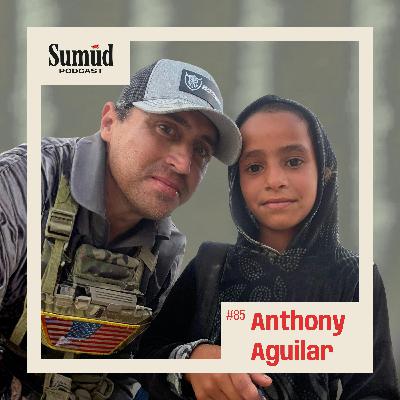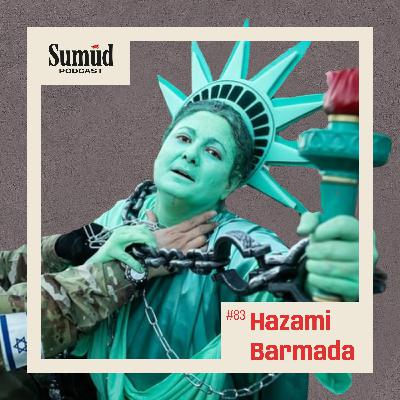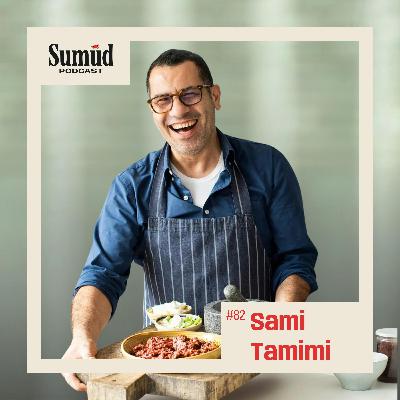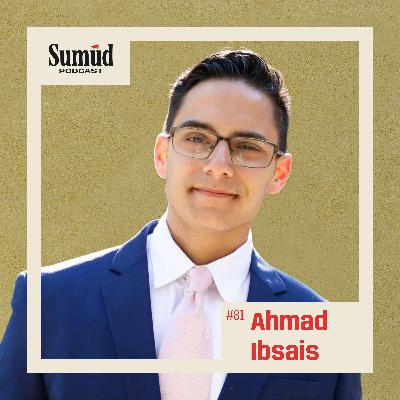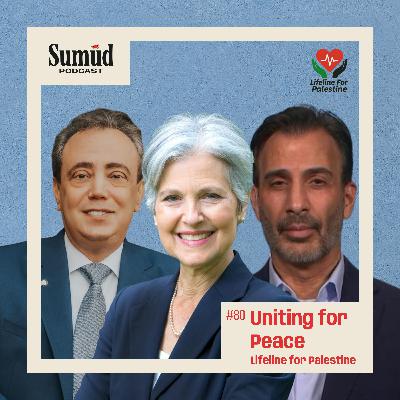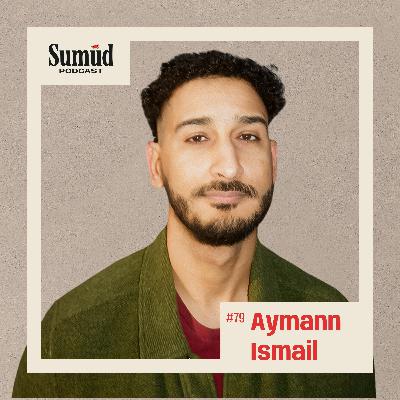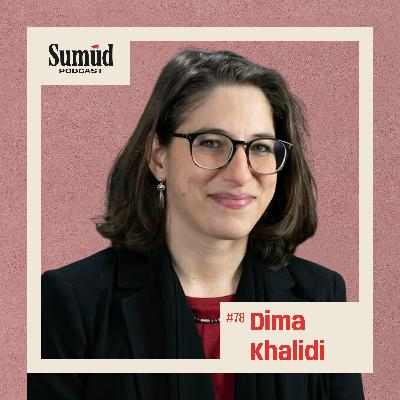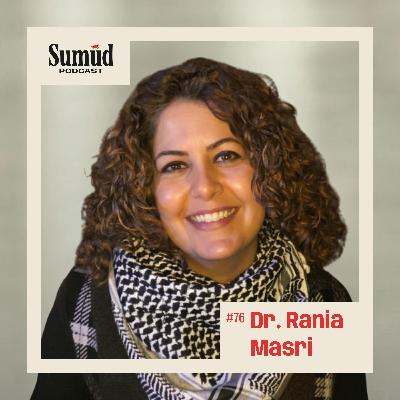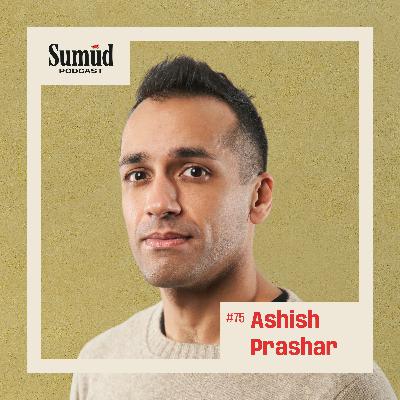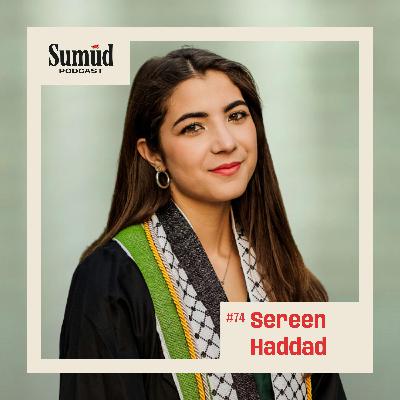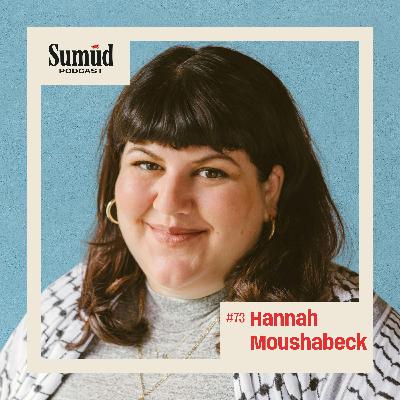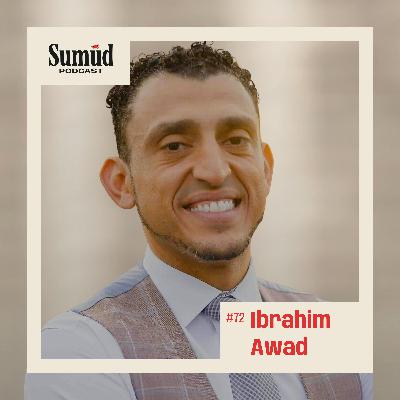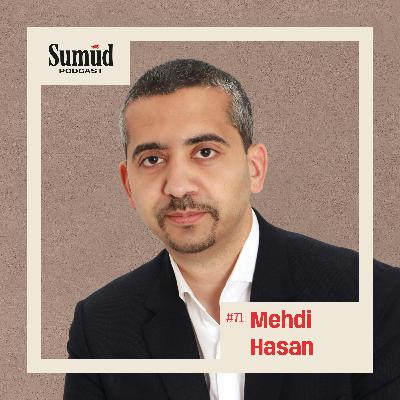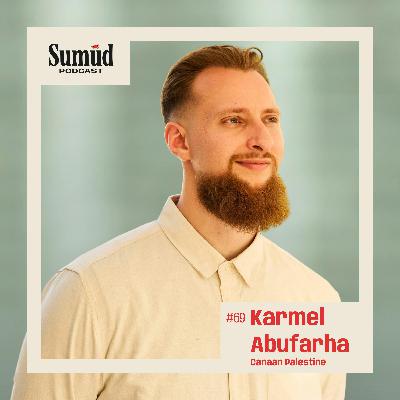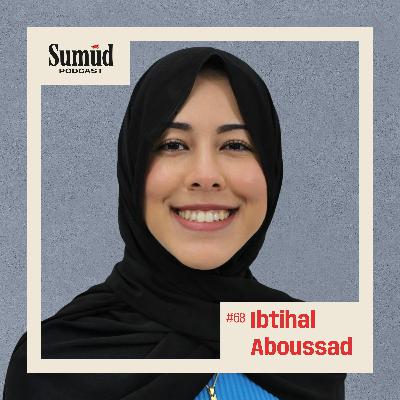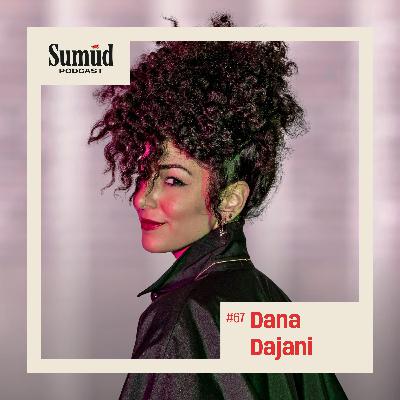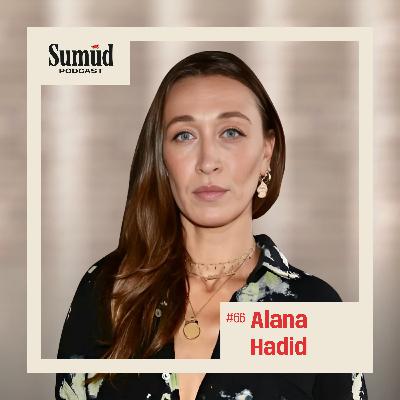Discover Sumud Podcast: Inspired by Palestine
Sumud Podcast: Inspired by Palestine

Sumud Podcast: Inspired by Palestine
Author: Dr. Ed Hasan
Subscribed: 45Played: 819Subscribe
Share
© Sumud, LLC 2024 286575
Description
Inspired by Palestine, Sumud Podcast emerges as a powerful platform for inspiration and empowerment for marginalized communities globally. Our mission? To elevate voices that have been sidelined by sharing the stories, experiences, and insights that demand to be heard. Get ready to join us in amplifying the voices shaping our world, one episode at a time. Welcome to Sumud Podcast – where we uplift, empower, and amplify.
Connect with Sumud Podcast on your favorite social media channels: Instagram, YouTube, Facebook, LinkedIn, TikTok Threads, and X (formerly known as Twitter).
Hosted by Dr. Ed Hasan
Connect with Dr. Ed Hasan on Instagram, LinkedIn, Threads, and X.
86 Episodes
Reverse
🎙️ This week on the Sumud Podcast, we sit down with retired US Army Special Forces Lieutenant Colonel Anthony Aguilar for one of the most difficult and urgent conversations we have ever hosted. What he believed was a humanitarian mission quickly revealed the truth of Gaza under siege. Anthony describes arriving to find Rafah destroyed, witnessing American contractors and Israeli forces firing on starving civilians, and meeting a young boy he calls Amir whose death changed everything. He reflects on complicity, conscience, and why he ultimately resigned, returned home, and began briefing US lawmakers on the atrocities he witnessed. This is a raw and necessary conversation about genocide, impunity, and the moral cost of silence.
🌍 Anthony Aguilar is a retired US Army Special Forces Lieutenant Colonel and former Green Beret who served for 25 years across Iraq, Afghanistan, and other conflict zones. In 2025 he worked with the newly formed Gaza Humanitarian Foundation through its subcontractor, UG Solutions, on what was presented as a neutral humanitarian mission. Once on the ground, he says he witnessed a coordinated system of forced displacement, engineered famine, and violent “aid” operations carried out in close coordination with Israeli authorities and supported by US contractors. His testimony has since informed media reporting, human rights investigations, and congressional briefings on US involvement in Gaza.
🔑 In this conversation, we explore
➡ How a supposed aid mission became a mechanism of displacement and control
➡ The destruction of Rafah and the true scale of civilian death
➡ Daily violence against starving families by American contractors and the IDF
➡ The ideology driving many US contractors
➡ The story of Amir and the smear campaign that followed
➡ Boston Consulting Group and the architecture of Gaza’s erasure
➡ Why Anthony chose to resign and speak publicly
➡ What the world must understand about the ongoing genocide in Gaza
⏱ Chapters
00:00 Introduction
01:35 Who Is Anthony Aguilar?
03:28 The Recruitment Call and the Gaza Humanitarian Foundation
12:35 Early Red Flags and Hasbara Tours
23:02 Entering Gaza
26:31 What the Sites Really Were
32:55 Violence by Contractors and the IDF
42:42 Boston Consulting Group and the Gaza Plans
55:15 The Story of Amir
1:08:40 The Smear Campaign
1:13:21 Speaking Out to Lawmakers
1:18:11 Do States Have a Right to Exist
1:22:12 Final Reflections
Sponsored by: The Karate Attorney (@karateattorney) fighting for justice inside and outside the courtroom. Visit www.KarateAttorney.com.
Sponsored by: The School of Radical Imagination (@school.of.radical.imagination), a new learning space turning knowledge into action through live, community-based courses on justice, liberation, and creativity. Enroll at www.RadicalImagination.school.
🎬 Full episode on: https://sumudpod.com
📲 Follow: @dredhasan | @sumudpod
Learn more about your ad choices. Visit megaphone.fm/adchoices
🎙️ This week on the Sumud Podcast, we sit down with dress historian and fashion researcher Wafa Ghnaim for a profound exploration of how Palestinian material culture carries memory, identity, and truth across generations. Through the dresses, headdresses, and stitched motifs that define our heritage, Wafa reveals how every thread holds stories far deeper than the colonial timeline. She reflects on exile, reclaiming beauty through a non-Western lens, growing up Palestinian in the United States, the emotional weight of Syria, the urgency of documenting elders’ knowledge, and the dangers of cultural appropriation. This conversation is an intimate look at the power of dress as resistance, continuity, and home, and the sacred responsibility of preserving what our ancestors left for us.
🌍 Wafa Ghnaim is a dress historian, researcher, author, archivist, curator, educator and embroiderer who learned from her mother, award-winning artist Feryal Abbasi-Ghnaim. Wafa specializes in Palestinian, Syrian, Jordanian, and Lebanese dress history, focusing on traditional embroidery techniques, historic reconstruction and oral history. Her publications include “Tatreez & Tea,” THOBNA (2023), Tatreez Companion (2024), and Tatreez Beauty (2024). She continues her mother’s legacy through the Tatreez Institute, founded in 2016, which stewards a collection of over 180 dresses and headdresses from Palestine, Jordan, Syria, and Lebanon for preservation, education, and research. She was the first Palestinian and Syrian embroidery instructor for the Smithsonian Museum, earned a senior interdisciplinary research fellowship at the Metropolitan Museum of Art, and was named by Vogue, alongside her mother, as “the world’s leading guardians of tatreez.” Wafa is now a Mellon Foundation Fellow at the Museum of the Palestinian People.
🔑 In this conversation, we explore
➡ The deep history and symbolism of Palestinian dress
➡ Why material culture carries memory across generations
➡ Cultural appropriation and the ethics of teaching tatreez
➡ The social life of objects and what dresses remember
➡ Syria, exile, grief and generational trauma
➡ Beauty, identity and decolonizing aesthetics
➡ The Tatreez Institute and the future of dress research
⏱ Chapters
00:00 Introduction
01:57 Who Is Wafa Ghnaim?
06:54 Beauty, Arab Glamour & Decolonizing Aesthetics
13:49 Preserving Elders’ Knowledge Through Oral History
24:25 Cultural Appropriation & Teaching Boundaries
29:44 Syria, Exile & Emotional Collapse
38:12 The Tatreez Institute & The 184-Dress Collection
56:05 Dresses as Memory, Material Witness & Legacy
1:15:11 Final Reflections
Sponsored by: The Karate Attorney (@karateattorney) fighting for justice inside and outside the courtroom. Visit www.KarateAttorney.com.
Sponsored by: The School of Radical Imagination (@school.of.radical.imagination), a new learning space turning knowledge into action through live, community-based courses on justice, liberation, and creativity. Enroll at www.RadicalImagination.school.
📚 Explore Tatreez Institute publications at https://www.tatreezandtea.com/publications
🎬 Full episode on: https://sumudpod.com
📲 Follow on Instagram: @tatreezandtea | @thetatreezinstitute | @dredhasan | @sumudpod
Learn more about your ad choices. Visit megaphone.fm/adchoices
🎙️ This week on the Sumud Podcast, we’re joined by Hazami Barmada, humanitarian, activist, and founder of the Humanity Lab Foundation, whose fierce empathy and faith have redefined what activism can look like. From her early work at the United Nations to the frontlines of D.C. protests, Hazami reveals what it means to live authentically, love fiercely, and refuse to be silent in the face of injustice. She reflects on the courage it takes to confront power, the role of faith and motherhood in her activism, and how radical love has become both her philosophy and her weapon.
🌍 Hazami Barmada is an award-winning public affairs & social impact strategist, social innovator and humanitarian. She is the Executive Producer and Host of the Webby-Award and Anthem-Award winning international affairs and human rights podcast, Finding Humanity. For 20+ years, Hazami has consulted and worked with leading global institutions including the United Nations, United Nations Foundation, Harvard, The Elders, B Lab, and the Royal Court of the Sultanate of Oman, to name a few. Most recently she worked at the Aspen Institute where she spearheaded the design and launch of the Digital Equity Accelerator, a joint initiative between HP Inc. and the HP Foundation, which under her leadership invested over $4 million into 17 organizations addressing social and economic inequalities around the world. Hazami has previously held several high-level consulting positions at the UN, including Coordinator for the United Nations Secretary General’s World Humanitarian Summit, Advisor to the UN Secretary-General’s Envoy on Youth, liaison to the UN SDG Strategy Hub for the launch of the 2030 Sustainable Development Agenda, and Innovation Advisor to UN Human Settlements Programme. Her campaigns, leadership coaching, and advocacy initiatives have reached tens of millions of people in 182+ countries, receiving recognition from the United Nations “SDG Action Awards” in 2020. Hazami is a graduate of Harvard University’s Kennedy School of Government where she was also an Edward S. Mason Fellow in Public Policy and Management and earned a certificate in Management, Leadership & Decision Sciences.
🔑 In this conversation, we explore:
➡ The story behind the Blinken encampment
➡ Balancing motherhood and frontline activism
➡ Radical love as a philosophy of resistance
➡ Islam, faith, and courage in the face of fear
➡ Doxxing, lawsuits, and the price of truth-telling
➡ Building communities of care beyond politics
⏱ Chapters:
00:00 Introduction & Radical Humanity
02:28 Who is Hazami Barmada?
07:31 Faith, Fear & the Blinken Encampment
16:40 Motherhood & Resistance
24:11 The Cost of Speaking Truth
34:29 Radical Love as Activism
41:27 Community Beyond Politics
54:38 From the UN to the Streets
1:02:42 Faith, Freedom & Legacy
Sponsored by: The Karate Attorney (Instagram @karateattorney) fighting for justice inside and outside the courtroom. Visit KarateAttorney.com
Sponsored by: The School of Radical Imagination, a new learning space turning knowledge into action through live, community-based courses on justice, liberation, and creativity. Enroll at www.RadicalImagination.school
🎬 Full episode on: https://sumudpod.com
📲 Follow:
Hazami Barmada: Instagram @hazami | X @hazamibarmada
Dr. Ed Hasan: Instagram @dredhasan
Sumud Podcast: Instagram @sumudpod
Learn more about your ad choices. Visit megaphone.fm/adchoices
This week on the Sumud Podcast, we sit down with Sami Tamimi, award-winning chef, author, and co-founder of Ottolenghi, to explore how heritage, hard work, and heart have shaped his life from Jerusalem to London’s kitchens.
Sami Tamimi is a British-Palestinian chef and author whose cooking is deeply rooted in the flavors of his homeland. In his first solo cookbook, Boustany: A Celebration of Vegetables from My Palestine, he embarks on a vibrant journey through Palestinian culinary traditions, celebrating simple, colorful dishes centered around vegetables and grains. This exploration builds on his earlier work as co-founder of the Ottolenghi restaurants and co-author of bestselling cookbooks: "Falastin" and "Jerusalem: A Cookbook". "Boustany" is Sami’s homage to the food and culture of Palestine.
In this deeply personal conversation, he reflects on his early life under occupation, his rebellious path from a truck company to the kitchen, and the struggle of navigating Israeli kitchens as a Palestinian chef. Sami opens up about cultural appropriation in “Israeli cuisine,” the politics of food, and the creation of his newest book, "Boustany", a love letter to Palestinian memory, land, and flavor.
With humor and grace, Sami reminds us that every dish carries a story of land, family, and survival.
🔑 In this conversation, we explore:
➡ Growing up in Jerusalem under occupation
➡ Becoming a chef against all odds
➡ Culinary appropriation and “Israeli cuisine”
➡ Food as political resistance and storytelling
➡ Writing Boustany: memory, land, and resilience
➡ Reclaiming Palestinian cuisine for future generations
Sponsored by: The Karate Attorney (@karateattorney) fighting for justice inside and outside the courtroom. Visit KarateAttorney.com
Sponsored by: The School of Radical Imagination, a new learning space turning knowledge into action through live, community-based courses on justice, liberation, and creativity. Enroll at RadicalImagination.school.
📌 Chapters:
00:00 – Introduction & Opening Reflections
01:15 – Early Life in JerusaleQm
05:29 – Rebellion, Art, and the Birth of a Chef
07:36 – Navigating Israeli Kitchens as a Palestinian
11:41 – What is ‘Israeli Food’?
13:36 – The Politics of Cooking & Food as Protest
18:13 – Founding Ottolenghi & Collaboration in ExileQ
21:11 – Boustany: Memory, Land & Palestinian Resilience
28:23 – October 7th, Speaking Out & Finding Voice
32:55 – Health, Balance & Using His Platform for Good
38:42 – Closing Reflections: Work hard, Follow the Heart
🎥 Full episode: www.sumudpod.com
📚 Check out Sami's website: www.sami-tamimi.com
📲 Follow: @sami_tamimi | @dredhasan
Learn more about your ad choices. Visit megaphone.fm/adchoices
🎙️ This week on the Sumud Podcast, we’re joined by Ahmad Ibsais, a law student, writer, and poet whose work captures life, loss, and defiance under siege. Through his acclaimed newsletter State of Siege, Ahmad documents a generation’s struggle for justice, blending legal insight, faith, and art to reclaim narrative power in a world determined to erase it.
In this episode, Ahmad speaks about courage on campus, finding strength through community, and how words can challenge systems of fear and censorship. He also shares his poem “Living in Memories,” a haunting reflection on endurance and remembrance amid unimaginable suffering.
Reflecting on his journey from Nablus to the University of Michigan, he navigated a law school environment steeped in Zionist influence while remaining steadfast in his convictions. He shares how speaking out for Palestine has come with professional risks, yet also profound purpose, and how faith and community have anchored him through moments of isolation and doubt.
Ahmad discusses the limits of the American legal system, its complicity in silencing pro-Palestine voices, and how young lawyers can still use the law as a site of resistance. From the courtroom to the classroom, he exposes the ways repression is disguised as “neutrality,” and why Palestinians must continue to name genocide even when institutions refuse to.
In this conversation, we explore:
➡ The making of State of Siege and documenting lived experience
➡ Speaking truth to power in academia and law
➡ Faith, memory, and the psychology of steadfastness (sumud)
➡ The role of poetry and storytelling in collective healing
➡ How young advocates are redefining resistance through word and action
Sponsored by: The Karate Attorney (@karateattorney) fighting for justice inside and outside the courtroom. Visit KarateAttorney.com
This video is for educational purposes only. It provides historical and political analysis to inform and educate viewers.
📌 Chapters:
00:00 – Introduction
02:00 – Introducing Ahmad Ibsais
04:00 – Palestine & the Power of Community
06:00 – Speaking Out in the Legal Field
10:00 – Censorship, Courage & Campus Activism
17:00 – The Birth of State of Siege
19:00 – The Role of Poets & Journalists in Gaza
21:00 – The Duty Not to Look Away
24:00 – Law, Power & the Limits of Justice
31:00 – Imagining Liberation: One State, One People
34:00 – “Living in Memories” – Poem Reading
36:00 – Closing Reflections: Free Palestine
🎬 Full episode on Sumud Podcast: https://sumudpod.com
📲 Follow: @ahmad.ibsais
📲 Follow our host: @dredhasan
📝 Read State of Siege:
https://substack.com/@ahmadibsais
https://ahmadibsais.substack.com/?utm_campaign=profile_chips
#Palestine #SumudPod #Resistance #EndGenocide #FreePalestine #StandWithPalestine #Steadfastness #BoycottIsrael
Learn more about your ad choices. Visit megaphone.fm/adchoices
🎙️This week on the Sumud Podcast, we amplify the voices behind Lifeline for Palestine and their urgent call to activate the Uniting for Peace process, a UN mechanism that empowers the General Assembly to act when the Security Council is blocked by vetoes. Recorded at a moment of moral urgency, this episode explores how global solidarity, diplomacy, and people power can come together to protect Palestinian civilians and end genocide.
Our guests: Craig Mokhiber, international human rights lawyer and former UN Director; Dr. Jill Stein, American physician, activist, and three-time Green Party presidential nominee, and Mark Elbourno, Palestinian American political strategist and Green Party leader, break down the legal, political, and moral dimensions of the Uniting for Peace plan.
Together, they reveal how Lifeline for Palestine has mobilized a growing global movement demanding accountability and action, pushing governments to honor international law and the will of the world’s majority. This conversation is a call to conscience, and a roadmap for how humanity can stand together against impunity and for justice.
The Sumud Podcast is sponsored by The Karate Attorney. Fighting for justice inside and outside the courtroom. Visit KarateAttorney.com or follow on Instagram @karateattorney to learn more.
In this conversation, we explore:
➡ What the Uniting for Peace process is and how it works
➡ How the US veto has blocked justice — and how to bypass it
➡ The role of Lifeline for Palestine and grassroots global movements
➡ Why Palestinians are leading this call for protection and accountability
➡ How ordinary people can take concrete action to shut down genocide
This video is for educational purposes only. It provides historical and political analysis to inform and educate viewers.
📌Chapters:
00:00 – Every Fighter Needs a Cause
02:00 – Introducing the Guests: Craig Mokhiber, Dr. Jill Stein & Mark Elbourno
06:30 – What is the Uniting for Peace Mechanism?
13:00 – The UN, Veto Power & Global Accountability
16:00 – Lifeline for Palestine: Origins and Purpose
23:00 – Global Solidarity & the Power of the People
36:00 – The Palestinian Call for Protection
43:00 – Why Action Still Matters: Overcoming Hopelessness
49:00 – Reclaiming International Law & the Global Majority
54:00 – What Happens If It Works? The Road Ahead
01:07:00 – Final Reflections & A Call to Action
🌐Take Action: Visit LifelineForPalestine.com
to send letters, sign petitions, and join upcoming global actions.
🎬Full episode on Sumud Podcast: https://sumudpod.com
📲Follow: @lifelineforpalestine , @craigmokhiber , @drjillstein , @markelbourno
📲Follow our host: @dredhasan
#Palestine #SumudPod #LifelineForPalestine #UnitingForPeace #FreePalestine #CraigMokhiber #JillStein #MarkElbourno #EndGenocide #Resistance
Learn more about your ad choices. Visit megaphone.fm/adchoices
🎙️This week on the Sumud Podcast, we sit down with Aymann Ismail, journalist, storyteller, and father, to explore how identity, faith, and truth-telling intersect in a time of moral crisis. A staff writer at Slate, the author of Becoming Baba, and president of the Arab and Middle Eastern Journalists Association (AMEJA). Aymann has spent years documenting how American media frames Arabs, Muslims, and Palestinians, and what it means to write honestly while the world burns.
Born in Newark, New Jersey, to Egyptian parents, Aymann came of age in the shadow of 9/11, an experience that forced him to navigate fear, belonging, and dual identity. In this deeply personal conversation, he shares how those formative years shaped his journalism from "Who’s Afraid of Aymann?" and PBS’s "American Muslims: A History Revealed" to his acclaimed essay, "The Store That Called the Cops on George Floyd", which won a Writers Guild Award and was nominated for a National Magazine Award.
With humility and clarity, he unpacks the ethical dilemmas of journalism, the burden of representation for Arab reporters, and the parallels between the post-9/11 era and the ongoing genocide in Gaza. Through it all, Aymann reflects on fatherhood, faith, and what it means to tell stories that refuse to dehumanize.
🔑 In this conversation, we explore:
➡ Growing up Arab Muslim in New Jersey after 9/11
➡ The parallels between anti-Palestinian racism and post-9/11 Islamophobia
➡ Journalism, bias, and courage in the era of genocide
➡ Storytelling, empathy, and moral responsibility in media
➡ Becoming Baba: faith, fatherhood, and belonging in America
This video is for educational purposes only. It provides historical and political analysis to inform and educate viewers.
📌 Chapters:
00:00 – Introduction & Opening Reflections
01:45 – 9/11 and October 7th
13:23 – Being Both: Arab American Identity & Belonging
22:18 – The Human Story of Being Gay and Muslim
25:13 – “Who’s Afraid of Aymann?”: Curiosity as Resistance
29:57 – Unearthing Muslim Roots in America with PBS
33:46 – The Store That Called the Cops on George Floyd
40:42 – Media Bias, Arab Journalists & Ethical Reporting
49:59 – Privilege, Courage & Writing Hard Truths
55:43 – Becoming Baba: Faith, Fatherhood & Finding Meaning
01:19:05 – Final Reflection: Teaching Faith in America
🎥 Full episode: https://sumudpod.com
📚 Check out Aymann’s work:
📖 Becoming Baba: https://bookshop.org/p/books/becoming-baba-fatherhood-faith-and-finding-meaning-in-america-aymann-ismail/dd46efc949a7959e?ean=9780385549615
🧠 AMEJA: https://www.ameja.org
📲 Follow: @aymanndotcom
📲 Follow: @dredhasan
#Palestine #SumudPod #FreePalestine #AntiZionist #EndtheOccupation #Media #Journalism #GeorgeFloyd #MuslimAmerican #Islamophobia #AMEJA
Learn more about your ad choices. Visit megaphone.fm/adchoices
🎙️ This week on the Sumud Podcast, we are joined by Dima Khalidi, founder and director of Palestine Legal, a US-based organization dedicated solely to defending the rights of people who speak out for Palestinian freedom.
Carrying her family’s long legacy of resistance into the present, Dima has spent decades on the legal front lines, protecting students, educators, and activists from repression. In this conversation, she explains how law is both weaponized against movements and reclaimed through organizing, offering a sharp look into the fight for free speech, student power, and justice in the US and beyond.
From historic cases like the Holy Land Foundation Five to recent victories against university crackdowns, Dima shows how lawfare, surveillance, and repression work—and how the movement continues to resist, organize, and win.
🔑 In this episode, we explore:
➡ The Khalidi family legacy and roots in Palestinian history
➡ Lessons from political prosecutions like the Holy Land Five
➡ Lawfare, anti-terror laws, and the Palestine exception to free speech
➡ Student courage, campus crackdowns, and legal victories
➡ Advice for young organizers and the importance of solidarity
📌 Chapters:
00:00 – Introduction
01:59 – Family Legacy and Roots of Resistance
08:37 – Early Cases That Shaped a Lifetime of Advocacy
16:21 – Political Prosecutions & the Holy Land Five
19:27 – Lawfare and the Founding of Palestine Legal
27:24 – Student Repression and Free Speech Battles
36:06 – Recent Legal Victories and their Impact
40:55 – Advice for Students, Staff, and Teachers
48:52 – Final Reflection: Inspiring the Next Generation
🎥 Full episode: https://sumudpod.com
🌐 Learn more: https://palestinelegal.org/
📲 Follow: @palestinelegal
📲 Follow: @dredhasan
#Palestine #FreePalestine #SumudPod #PalestineLegal #StudentPower #Lawfare #FreeSpeech #Decolonize #Justice
Learn more about your ad choices. Visit megaphone.fm/adchoices
🎙️This week on the Sumud Podcast, recorded live at ADC’s ArabCon, we welcome Jordanian Palestinian singer, songwriter, and producer Dana Salah. Known for blending traditional Palestinian folklore with global contemporary sounds, Dana has pioneered a genre she calls Falahi Pop. Her music is not just art; it’s a vessel for storytelling, cultural preservation, and resistance.
In this conversation, Dana shares her journey from performing in New York under the name King Deco to returning to the Arab world and writing music in Arabic during COVID. She reflects on how songs like Ya Tal3een emerged from grief after October 7 and transformed into anthems of hope and empowerment, carrying Palestinian heritage to global audiences. Dana also discusses the influence of her grandfather, displaced from Haifa in 1948, whose advocacy and spirit continue to flow through her work.
Together, we explore how music can serve as both therapy and resistance, a way of keeping Palestinian identity alive for future generations, and a call for young women to embrace authenticity and courage.
🔑 In this conversation, we explore:
➡ How folklore, tatreez, and heritage shape Falahi Pop
➡ The story behind Ya Tal3een and writing through trauma
➡ Shifting from English to Arabic songwriting
➡ Music as resistance, healing, and empowerment
➡ Ancestry, legacy, and advice to young Palestinian girls
This video is for educational purposes only. It provides historical and political analysis to inform and educate viewers.
📌 Chapters:
00:00- Storytelling as Resistance
01:38- Introduction
03:24– Dana Salah’s Journey: From King Deco to Falahi Pop
07:33– Ya Tal3een: Writing Through Grief & Finding Empowerment
11:39– Arabic vs English Songwriting & Honoring Heritage
17:51– Her Grandfather’s Legacy & Carrying Palestine Forward
21:01– Advice for Young Palestinian Girls & Closing Reflections
🎥 Full episode on Sumud Podcast: https://sumudpod.com
📲 Follow: @danasalah
📲 Follow: @dredhasan
#Palestine #SumudPod #Arabcon #FreePalestine #Falahi #Resistance #DanaSalah #Singer #Songwriter #Producer
Learn more about your ad choices. Visit megaphone.fm/adchoices
🎙️ This week on the Sumud Podcast, Dr. Rania Masri joins us to speak on liberation, land, and the interconnected struggles for justice. An environmental scientist and long-time activist, Rania brings decades of experience in organizing to the fight against colonialism and ecocide.
Since 1990, Rania has organized for justice and against systems of oppression and war through protests, teach-ins, conferences, political organizing, public speaking training, writings, research, and media work. She taught holistic environmental sciences (including environmental justice) at the university level for nearly two decades. She served as an expert in the Court of Conscience, presenting testimony on the environmental impact of the 2006 Israeli War on Lebanon.
In this episode, Rania connects the fight for Palestinian freedom to global movements for environmental and social justice. She explains how Zionism imposes ecocide on the land of Palestine, unpacks the colonial legacy of Sykes–Picot and the artificial borders of Greater Syria, and invites us to learn from the socialist wisdom of trees, what she calls the “Mother Tree” model of care, resistance, and community.
🔑 In this conversation, we explore:
➡ The environmental devastation of Israeli occupation and Gaza’s ecocide
➡ The colonial blueprint of Sykes–Picot and rejecting imposed borders
➡ Trees as teachers: Mother Trees, socialism, and organizing
➡ How solidarity—not charity—can reshape our future
This video is for educational purposes only. It provides historical and political analysis to inform and educate viewers.
📌 Chapters:
00:00- Introduction
01:35- Facing the Unspoken Issues
12:54- Engaging Despite Differences: Republicans, Democrats, and Greens
15:41- Holding Our Leaders Accountable
22:37- Greater Syria: Rejecting Borders & Claiming Our Lands
24:56- Side by Side: Liberation, Labor, and Community
28:26- Origins and Goals: The Arab and Muslim Green Party Caucus
34:17- Exploring the Core: Life as an Environmental Scientist
38:39- Examining Ecocide: The Impact of Occupation
46:00- Environmental Advocacy: Where to Begin?
49:23- Final Reflections: Hope, Resistance & the Fight for Palestine
🎥 Full episode on Sumud Podcast: https://sumudpod.com
🌐Check out: https://ncejn.org/
📲 Follow: @raniamasri
📲 Follow: @dredhasan
#Palestine #FreePalestine #SumudPod #Antizionist #AntiColonial #Arab #Occupation #Decolonize #Lebanon #Syria
Learn more about your ad choices. Visit megaphone.fm/adchoices
🎙️ This week on the Sumud Podcast, we’re joined by Ashish Prashar, a political strategist and human rights activist who has advised Middle East peace envoys, UK politicians, and international bodies. He shares a unique perspective shaped by years of firsthand experience in Israel and Palestine, revealing realities that often go unseen in mainstream narratives.
From 2010 to 2012, Ashish lived in the West Bank and witnessed systemic policies controlling Palestinian communities. These experiences highlight the everyday mechanisms of apartheid and the human cost behind the policies.
In this episode, Ashish discusses the broader lessons of his experiences, from international advocacy to solidarity work. He emphasizes understanding both the human and political dimensions of the conflict, offering insights for activists, policymakers, and anyone seeking justice.
🔑 In this conversation, we explore:
➡ What living in Israel and Palestine taught him about systemic apartheid
➡ The meaning and implications of “sanitized” roads
➡ How political systems and propaganda shape narratives of the conflict
➡ The role of international advocacy and solidarity
➡ Lessons for activists and observers striving for justice
📌 Chapters:
00:00- Introduction
02:00- When Hatred Found Us at Play
12:52- Prison at Seventeen: Assaulted and Tested
21:25- Ashish’s Background: Political Strategy & Human Rights Work
27:47- Between Blair and Palestine
31:33- Living in the West Bank: Firsthand Experiences of Segregation
35:32- Football Against Apartheid
45:56- Airbnb: Profiting from Genocide
51:22- Reflections on Justice, Responsibility, and Speaking Out
🎥 Explore more at: https://sumudpod.com
🌐Check out: https://www.ashishprashar.me/
📲Follow: @ash_prashar
📲Follow: @dredhasan
#Palestine #SumudPod #FreePalestine #GazaGenocide #EndTheOccupation #JusticeForPalestine #ApartheidIsrael #HumanRights #NGO #BDS
Learn more about your ad choices. Visit megaphone.fm/adchoices
🎙️ This week on the Sumud Podcast, we’re joined by Sereen Haddad, a Palestinian student activist who helped lead the VCU Gaza solidarity encampment before police violently dismantled it!
In the days leading up to graduation, Sereen had been pepper-sprayed, beaten, and sent to the ER with head trauma as VCU and Virginia State Police stormed the encampment. Three days before graduation, she received an email from the university stating that she could walk the stage, but her degree would not be conferred due to her involvement in the protest.
Sereen’s story is not only about repression but also resilience. She experienced firsthand the violence facing student organizers across the U.S.—and yet, she insists: Palestinians refuse to remain quiet. Instead of breaking her, these moments only strengthened her resolve. With the help of Palestine Legal, she fought back and won her degree—showing that student movements have power and that universities are not neutral but complicit.
🔑 In this conversation, we explore:
➡ What it means to be Palestinian in a world that dehumanizes your people
➡ Police repression at VCU’s Gaza encampment
➡ The loss of her family members in Gaza and why they are people, not statistics
➡ Why the divestment movement matters and terrifies universities
➡ Advice to other students facing repression on campus
➡ The resilience, pride, and love at the heart of Palestinian identity
This video is for educational purposes only. It provides historical and political analysis to inform and educate viewers.
📌 Chapters:
00:00 – Introduction
01:42 – VCU Withheld Her Degree & the Days After October 7
10:02 – The VCU Encampment: Police Violence & Repression
16:07- The Haddad Legacy: Refusal & Resistance
20:47- Graduation Blocked: Student Conduct vs. Palestine Solidarity
29:00- Morals 101 & Calling in Backup: Palestine Legal
36:53- Why Silence is Not an Option
41:56- Final Reflections: Pride, Struggle & Speaking Out
📲 Follow: @sereen_haddad_
🎙 Follow our host: @dredhasan
🌐 Explore more: https://sumudpod.com
#Palestine #SumudPod #FreePalestine #DivestFromGenocide #Gaza #StudentProtests #CampusEncampments #EndTheOccupation #Divest #BDS
Learn more about your ad choices. Visit megaphone.fm/adchoices
This week on the Sumud Podcast, we’re joined by Hannah Moushabeck, a Palestinian American author, editor, and book marketer. Born into a family of publishers and raised in western Massachusetts, Hannah grew up in the world of books. Today, she carries that legacy forward at Interlink Books, one of the only Palestinian-owned publishing houses in the U.S.
Her acclaimed debut, "Homeland: My Father Dreams of Palestine" (Chronicle Books, 2023), is a lyrical picture book inspired by her father’s memories of Palestine. With warmth and humor, it offers young readers both a window into a beloved homeland and a mirror for displaced families everywhere.
In this conversation, Hannah shares her journey growing up surrounded by stories, the challenges of representing Palestine in children’s literature, and the backlash she’s faced, including censorship and soft bans. She also reflects on reclaiming her identity, creating community for emerging Palestinian authors, and why storytelling for children is a vital act of resistance.
🔑 In this episode, we explore:
➡ Why representation in children’s books is survival, not just storytelling
➡ The story of Interlink Books & resisting cultural erasure
➡ The rise of censorship and soft suppression of Palestinian voices
➡ Building community through Palestinians in Kid Lit
➡ Homeland as an act of love, memory, and joy
This video is for educational purposes only. It provides historical and political analysis to inform and educate viewers.
Chapters:
00:00 – Introduction
01:21 – Growing Up in the Only Palestinian Publishing House in the U.S.
06:21 –The Faces of Interlink Books
9:56- How to Approach Interlink or Hannah About an Idea?
11:38- Childhood Erasure & Reclaiming Palestinian Identity
15:31 – Discovering Naomi Shihab Nye & the Power of Children’s Books
21:11- Writing Homeland & Sparking Questions Through the Story
26:52 – Soft Censorship, Library Bans & Resilience
29:35- Main Takeaway from Wondering About Palestine
31:25- Claiming My Identity: The Moment I Said, “I’m Palestinian"
33:33 – Messages to young Palestinians & aspiring writers
📲 Follow Hannah Moushabeck: @hannahmoushabeck, @interlinkbooks
🎙 Follow our host: @dredhasan
🌐 Explore more at: https://sumudpod.com
Check out: https://interlinkbooks.com/
📕 Hannah’s Book: Homeland: https://bookshop.org/p/books/homeland-my-father-dreams-of-palestine-hannah-moushabeck/18788705?ean=9781797202051&next=t
#Palestine #SumudPod #PalestinianStories #Books #Author #Kidsbook #Homeland #Stories #Storytelling
Learn more about your ad choices. Visit megaphone.fm/adchoices
🎙️This week on the Sumud Podcast, we’re joined by Ibrahim Awada, a US-based trial lawyer, founder of The Awad Law Firm, and unapologetic voice for Palestine. Known for securing record-breaking verdicts and training trial lawyers across the country, Ibrahim has also emerged as a fearless advocate for his community, refusing to stay silent even when colleagues and judges turned away.
From Georgia’s courtrooms to his nonprofit Palistory, dedicated to preserving Nakba survivor testimony, Ibrahim blends legal excellence with moral clarity. His story is one of sacrifice, faith, and the painful realization that some “progressive” allies were never truly allies at all.
In this powerful conversation, Ibrahim reflects on what it means to confront injustice, whether in the courtroom or in Gaza, and why silence is complicity. He reminds us: the work is ours, the outcome is God’s.
🔑 In this conversation, we explore:
➡ Why sacrifice is inevitable and why it must be ours, not our children’s
➡ The Georgia judge who said, “There are no innocents in Gaza.”
➡ How October 7 unmasked false allies in the legal profession
➡ Growing up Palestinian in the U.S. & the impact of Muhammad al-Durrah’s killing
➡ Founding Palistory to preserve Nakba survivor stories
➡ Faith, courage, and why speaking up is easier now than ever
This video is for educational purposes only. It provides historical and political analysis to inform and educate viewers.
📌 Chapters:
00:00 – Introduction
1:58- Identity & Representing His Community
04:56 – Commitment to Faith & Palestinian Identity
08:46 – Why ‘Karate Attorney’?
14:45 – Confronting Judge Stacey Hydrick’s Gaza Comments
21:42 – Trial Lawyers College & the “Defense of the Damned”
28:43- Frames of Effort
32:05- Founding Palistory & Preserving Nakba Testimonies
34:10 – Message to CEOs, Professionals & Silent Allies
38:22- Why Zionism is Supremacy, Not Judaism
41:19- What It Means to Ibrahim to Be Palestinian
44:50- Take Action & Don’t Wait
46:30 – A Final Word: No Good Deed Goes Unrewarded
📲 Follow: @karateattorney, @palistory.usa
🎙 Follow our host: @dredhasan
🌐 Explore more: https://sumudpod.com
Check out: https://theawadlawfirm.com/
https://palistory.com/
#Palestine #SumudPod #FreePalestine #GazaGenocide #JusticeForPalestine #StandWithPalestine #IndependentMedia #Gaza #Nakba
Learn more about your ad choices. Visit megaphone.fm/adchoices
🎙️This week on the Sumud Podcast, we’re joined by Mehdi Hasan—Founder and Editor-in-Chief of Zeteo, the independent media platform built to challenge power and amplify silenced voices. Known worldwide for his fearless debate style and sharp fact-checking, Mehdi has spent 25 years exposing propaganda and holding leaders to account.
His layered identity—son of Indian immigrants, a Shia Muslim growing up in the UK as a “minority within a minority,” and now an immigrant navigating life across the U.S. and U.K.—has shaped his worldview. These experiences of being both insider and outsider inform his politics, his journalism, and his commitment to journalistic integrity in an era of disinformation.
From Win Every Argument to his viral TV debates, Mehdi’s work blends storytelling with accountability. He reflects on what it means to live between worlds—and how identity, politics, and media intersect in today’s polarized climate.
Beyond his career highlights, Mehdi opens up about the struggles of independent journalism, the dangers faced by Palestinian reporters in Gaza, and why disinformation remains one of the greatest threats to truth.
🔑 In this conversation, we explore:
➡ Why Mehdi built Zeteo to rival corporate media
➡ How lies and propaganda became his “antagonist”
➡ Growing up Muslim in the West
➡ Lessons from Win Every Argument on debate & persuasion
➡ Advice for Palestinian and pro-Palestinian students facing attacks
➡ The murder of Gaza’s journalists and why their voices matter
This video is for educational purposes only. It provides historical and political analysis to inform and educate viewers.
📌 Chapters:
00:00 – Introduction
01:28 – The Birth of Zeteo & Challenging Power
03:19 – Propaganda, Lies & Mehdi’s “Antagonist”
07:09 – Growing Up Shia Muslim in the West
10:24 – Sectarianism, Geopolitics & Divide-and-Rule
13:23 – Debate Lessons from Win Every Argument
19:54 – Advice for Palestinian & Pro-Palestinian Students
24:56 – Rapid Fire Questions
32:52- Final Message: Support Independent Media
📲 Follow: @mehdirhasan & @Zeteo
🎙 Follow our host: @dredhasan
Shop his book: https://bookshop.org/p/books/win-every-argument-the-art-of-debating-persuading-and-public-speaking-mehdi-hasan/18308276?ean=9781250853462&next=t
🌐 Explore more: https://sumudpod.com
Check out: https://zeteo.com/
#Palestine #Sumudpod #MehdiHasan #FreePalestine #IndependentMedia #WinEveryArgument #Gaza #Journalism
Learn more about your ad choices. Visit megaphone.fm/adchoices
This week on the Sumud Podcast, we’re joined by journalist and BreakThrough News host Rania Khalek for a special episode diving into her latest documentary, Israeli Terror in Lebanon: Inside the Pager Attacks. The documentary uncovers the untold story behind the September 17th pager explosions in Lebanon—a years-long covert Israeli operation that left civilians maimed and silenced.
📺 Watch Rania’s full documentary: https://www.youtube.com/watch?v=2mqqDTIs4vE
From the hidden manufacturing sabotage to the horrific injuries, Rania takes us through the political, human, and media dimensions of the attack and why Western coverage gave airtime to Mossad agents while denying a platform to the victims, including children.
As a Lebanese journalist, Rania offers a deeply personal perspective on the resilience of communities under siege and the friendships and humor that survive even in the aftermath of violence.
🔑 In this conversation, we explore:
➡ How the pager attacks were planned and executed
➡ The human cost: stories of survivors like Ali and Hussein
➡ Anti-Shia sentiment and blocked access to Iranian medical aid
➡ The role of Western media in shaping narratives
➡ The resilience and resistance of Lebanon’s most targeted communities
This video is for educational purposes only. It provides historical and political analysis to inform and educate viewers.
📌 Chapters:
00:00 – Introduction & Rania’s Background
04:15 – How the Pager Explosions Happened
11:32 – Human Stories: Ali, Hussein, and Life After Injury
19:47 – Media Silence and Mossad’s Airtime
27:58 – Anti-Shia Sentiment & Blocked Medical Aid
42:52- Behind the Edits: What Was Left Out
45:53- A Scary New Reality for Lebanon
52:06- The One Message to Carry Forward
Reach out to raniaKhalek@gmail.com, to connect with the people involved.
📲 Follow: @BreakThroughNews
🎙 Follow our host: @dredhasan
Check out Rania's episode: https://sumudpod.com/episodes/rania-khalek/
🌐 Explore more: https://sumudpod.com
#Palestine #Sumudpod #Lebanon #FreePalestine #EndTheOccupation #LebanonUnderAttack #HumanRights #WarCrimes #InternationalLaw
Learn more about your ad choices. Visit megaphone.fm/adchoices
🎙️This week on the Sumud Podcast, we’re joined by Karmel Abufarha from Canaan Palestine—a Palestinian brand rooted in the land, the olive tree, and the power of community. Representing generations of farmers, Canaan shares how olive oil connects Palestinian families to the world and why farming in Palestine is both a daily routine and a quiet act of resistance.
Karmel has spent his life building Canaan Palestine alongside his father, Nasser Abufarha, to preserve Palestinian heritage through food and farming. As a Palestinian American who moved from Madison, Wisconsin, to live full-time in Palestine, Karmel brings a rare perspective on how environment and culture reshape our values.
But beyond abundance lies injustice. We discuss the obstacles farmers face under Israeli occupation—checkpoint delays, permit restrictions, and blocked access to their groves—and how Canaan is working to ensure these stories are heard across the globe.
🔑 In this conversation, we explore:
➡ Farming as a cultural and political inheritance
➡ Why even professionals return to the land
➡ Olive oil as a link between Palestine and the world
➡ The everyday logistics of farming under occupation
➡ How global fair trade often excludes Palestine
This video is for educational purposes only. It provides historical and political analysis to inform and educate viewers.
📌Chapters:
00:00 – Introduction & Karmel's Upbringing
04:29 – Canaan's Origin & What Farming Means in Palestine
10:05 – Key Terms: Fair Trade, Sustainability, & Biodiversity
25:41- A Message from the Land: What Farmers Would Say
31:19 – Farming as a Form of Resistance
33:44 – From Generation to Generation: The Wisdom of Palestinian Farming
47:45- Modern Life, Palestinian Roots: The Vision of Hayat Canaan
52:24 – Dignity, Markets, and the Next Chapter for Canaan
📲 Follow: @canaanpalestine
🎙 Follow our host: @dredhasan
🌐 Explore more: https://sumudpod.com
📘 Read Canaan’s 2024 Reflection: https://canaanpalestine.com/pages/2024report
#Palestine #SumudPod #Oliveoil #Olivetree #Palestinianfood #Canaan #Palestinianculture #Freepalestine #Holyland
Learn more about your ad choices. Visit megaphone.fm/adchoices
🎙️This week on the Sumud Podcast, we’re joined by Ibtihal Aboussad, a Moroccan-born software engineer, educator, and No Azure for Apartheid campaign organizer. A Harvard graduate and former Microsoft employee, Ibtihal made headlines earlier this year when she publicly confronted Microsoft’s CEO for the company’s role in Israel’s genocide against the Palestinian people, resulting in her being fired from her job.
In this powerful conversation, Ibtihal shares the story behind that viral moment and the years of quiet resistance that led to it. From grassroots education initiatives in Morocco to building ethical technologies and manning suicide hotlines, her journey is a rare fusion of tech, spirituality, and social justice.
She reflects on how Islam grounds her commitment to collective liberation, what it meant to grow up under cultural imperialism in North Africa, and why she believes that true resistance is never just personal; it’s organized, intentional, and deeply principled.
🔑 In this conversation, we explore:
➡ Tech complicity in genocide and organizing from inside Big Tech
➡ Growing up under neocolonialism in Morocco
➡ Faith as resistance to individualism and apathy
➡ Why she threw a kufiya on stage at Microsoft
➡ The emotional toll of working for a company enabling genocide
This video is for educational purposes only. It provides political, cultural, and ethical insight into corporate complicity, worker resistance, and the Palestinian liberation struggle.
📌 Chapters:
00:00 – Introduction: Who is Ibtihal Aboussad?
05:44 – Growing Up in Morocco & Early Tech Education
11:28 – Harvard, Islam & Countering Individualism
17:30 – Working at Microsoft, Discovering Complicity & Organizing from Within
31:54 – The Protest, Kufiya Toss & Resignation
54:52 – What Comes Next: Collective Liberation & Tech That Heals
🇵🇸 Follow Ibtihal: @ibtihal.aboussad
🎙 Follow our host: @dredhasan
Don’t miss it—tune in now at https://sumudpod.com
🌐Check out: https://noazureforapartheid.com/
#Palestine #SumudPod #Tech #Microsoft #PalestineUnderAttack #FreePalestine #VoicesFromGaza #EndTheOccupation #GazaUnderSiege
Learn more about your ad choices. Visit megaphone.fm/adchoices
🎙️This week on the Sumud Podcast, we’re joined by Dana Dajani—award-winning Palestinian-American poet, actress, and humanitarian. Known for her fusion of spoken word and theater, Dana uses performance as a form of resistance, remembrance, and radical love.
In this powerful conversation, Dana reflects on what it means to choose to be Palestinian—as an identity, an inheritance, and a calling. She shares the story of her grandmother Aida, whose exile became Dana’s compass. She opens up about the deeply personal project The Poor Millionaires, an archival film and fashion journey born from family footage, memory, and loss.
From navigating third culture identity to coping with survivor’s guilt, Dana brings rare emotional honesty to questions of creativity, trauma, and legacy. This episode is a tribute to the storytellers who came before—and the stories we must carry forward.
🔑 In this conversation, we explore:
➡ What it means to choose to be Palestinian in diaspora
➡ Preserving her grandmother’s dresses, films, and history
➡ Theater as embodied resistance and poetic healing
➡ The mental and emotional toll of witnessing genocide
➡ How art creates space for empathy, conversation, and transformation
This video is for educational purposes only. It provides historical, cultural, and political insight to inform and inspire viewers.
📌 Chapters:
00:00 – Introduction: Theatre Roots & Being a Narrator
06:26 – Childhood, Pursuing a Fine Art Degree & The Human Spirit Project
11:17 – Choosing Art Over Expectations, Third Culture Identity & Discovering Family History
24:50 – The Poor Millionaires, the Legacy of Aida Dajani & Love Letters to the Land
38:39 – Dana’s Creative Process & Trauma
50:37 – Creating Space for Justice & Finding Purpose Again
01:00:47 – Legacy, Loss & Carrying the Stories Forward
01:06:47- Final Message & Performing
🇵🇸 Follow Dana: @DanaDajanipoetry
🎙 Follow our host: @dredhasan
Dr.Cornel West episode: https://sumudpod.com/episodes/dr-cornel-west/
🌐 Learn more at: https://sumudpod.com
#Palestine #SumudPod #FreePalestine #Gaza #Poetry #PerformanceArt #Resistance #Storytelling #Artivism #HumanRights #CeasefireNow
Learn more about your ad choices. Visit megaphone.fm/adchoices
🎙️This week on the Sumud Podcast, we’re joined by Alana Hadid—creative director, activist, and storyteller. As the force behind Watermelon Pictures and host of The Seeds Podcast, Alana is working to reimagine media through a justice-centered lens. From launching the groundbreaking streaming platform Watermelon+ to preserving her family’s Palestinian legacy, Alana weaves creativity and resistance into every part of her life.
In this deeply personal conversation, Alana opens up about her childhood, her grandmother’s displacement during the Nakba, and the emotional journey of visiting her father’s birthplace in Safed. She shares the joys and heartbreak of advocacy, what it means to show up for Palestine through media, and why self-love is an act of defiance.
As the conversation unfolds, Alana also reflects on her mixed Palestinian-Irish identity, her path through political education and entrepreneurship, and the mental and emotional labor of public-facing advocacy. From her stepmother role to navigating online hate, she offers an honest and grounded portrait of what it means to live one's politics with love, purpose, and clarity.
🔑 In this conversation, we explore:
➡ Creating Watermelon+, a streaming platform by and for Palestinians
➡ Visiting her family's home in Safed and honoring intergenerational memory
➡ Why Alana sees liberation as her religion
➡ The mental toll of advocacy & the importance of therapy and healing
➡ Building a life rooted in justice, joy, and storytelling
This video is for educational purposes only. It provides historical and political analysis to inform and educate viewers.
📌Chapters:
00:00 – Introduction: Boycotts, Safe Platforms & Watermelon+
04:05 – Growing Up Palestinian-Irish in the DMV
08:29 – Family, Nakba Stories & Visiting Safed
17:34 – Identity, Religion & Liberation as Faith
24:44 – Cultural Power & Creative Resistance
33:41 – Self-Worth, Mental Health & Surviving the Spotlight
41:55 - Watermelon Pictures, Boycotting & The Seeds Podcast
52:09 – Reflection: Cooking, Sisterhood & Living a Grounded Life
📲 Follow Alana: @lanzybear
🇵🇸 Support and subscribe to: @watermelonpicturesco
🎙 Follow our host: @dredhasan
🌐 Learn more at: https://sumudpod.com
📺 Stream Watermelon+: https://watermelonpictures.com
#Palestine #SumudPod #AlanaHadid #WatermelonPictures #TheSeedsPodcast #FreePalestine #PalestinianVoices #CreativeResistance #Storytelling #Nakba #MentalHealth
Learn more about your ad choices. Visit megaphone.fm/adchoices


